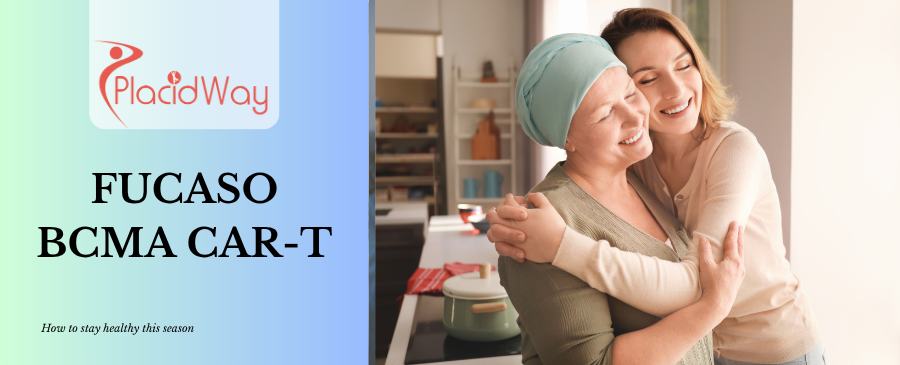
Hope Beyond Limits: Understanding FUCASO BCMA CAR-T for Multiple Myeloma
Receiving a diagnosis of multiple myeloma, especially when standard treatments have failed, can be incredibly challenging. For patients facing relapsed or refractory multiple myeloma, the search for effective, cutting-edge solutions often leads to advanced immunotherapies like FUCASO BCMA CAR-T. This revolutionary treatment harnesses the power of your own immune system to fight cancer, offering a beacon of hope where conventional options may have run out. Understanding this complex therapy, its benefits, and how to access it – particularly through medical tourism – is crucial for patients and their families seeking the best possible outcomes.
FUCASO BCMA CAR-T therapy represents a significant leap forward in personalized cancer treatment. It involves collecting a patient's T-cells, genetically modifying them in a lab to recognize and attack multiple myeloma cells that express the BCMA protein, and then infusing these enhanced "CAR-T cells" back into the patient. This highly targeted approach aims to eradicate the cancer with remarkable precision. As a cutting-edge procedure, patients often explore international options to access FUCASO BCMA CAR-T therapy, looking for advanced facilities, experienced specialists, and sometimes more accessible or affordable care abroad.
This comprehensive guide will walk you through everything you need to know about FUCASO BCMA CAR-T, from understanding the underlying condition of multiple myeloma and its symptoms, to the intricate details of the CAR-T process, recovery, potential risks, and importantly, how to navigate the world of medical tourism to find the best treatment options.
What is FUCASO BCMA CAR-T Therapy for Multiple Myeloma?
At its core, FUCASO BCMA CAR-T therapy is an advanced form of immunotherapy designed to treat multiple myeloma, a cancer of plasma cells in the bone marrow. The "CAR" in CAR-T stands for Chimeric Antigen Receptor. Imagine your body's immune cells (T-cells) as an army. In cancer, this army sometimes struggles to identify and destroy cancer cells effectively. CAR-T therapy acts like giving specific soldiers a highly advanced GPS system – the Chimeric Antigen Receptor – that tells them exactly where the enemy (myeloma cells) is hiding.
Specifically, FUCASO BCMA CAR-T targets B-cell maturation antigen (BCMA), a protein found predominantly on multiple myeloma cells. The process typically involves:
- Apheresis: A procedure similar to blood donation, where T-cells are collected from your blood.
- Genetic Reprogramming: In a specialized lab, these T-cells are genetically modified to express the CAR, which is designed to latch onto BCMA. Once modified, they are expanded to millions of cells.
- Chemotherapy (Lymphodepletion): Before infusion, you may receive a short course of chemotherapy to reduce your existing T-cells, making space for the new CAR-T cells to multiply and work effectively.
- Infusion: The modified FUCASO BCMA CAR-T cells are infused back into your bloodstream.
- Targeted Attack: Once in your body, these "supercharged" T-cells multiply, recognize the BCMA on myeloma cells, and launch a powerful attack, destroying them.
This therapy is often considered for patients with multiple myeloma who have had previous treatments that were unsuccessful (refractory) or whose cancer has returned after treatment (relapsed multiple myeloma). It offers a highly personalized and potentially long-lasting response.
What Symptoms Indicate You Might Need Advanced Multiple Myeloma Treatment?
Multiple myeloma often presents with a range of symptoms that can worsen over time. Patients, or those searching for information, frequently look for "multiple myeloma symptoms," "signs of relapsed myeloma," or "bone pain myeloma." Recognizing these early or persistent signs is crucial:
- Bone Pain: Often in the back, ribs, or hips, and can be severe. This is due to myeloma cells growing in the bone marrow, weakening bones. Patients might experience "unexplained fractures."
- Fatigue and Weakness: A common symptom caused by anemia (low red blood cell count), which happens when myeloma cells crowd out healthy blood-producing cells in the bone marrow. People often search for "myeloma fatigue" or "anemia with cancer."
- Frequent Infections: Myeloma affects the immune system, making patients more susceptible to infections like pneumonia or urinary tract infections. This can lead to searches for "weakened immune system myeloma."
- Kidney Problems: High levels of certain proteins (M-proteins) or calcium in the blood can damage the kidneys, leading to symptoms like swelling in the legs, shortness of breath, or reduced urine output. "Myeloma kidney damage" is a common concern.
- High Calcium Levels (Hypercalcemia): When bones are broken down, calcium is released into the blood. Symptoms include extreme thirst, frequent urination, constipation, confusion, and muscle weakness.
- Numbness or Tingling: Nerve damage (neuropathy) can occur if tumors press on nerves, leading to numbness, tingling, or weakness, often in the legs.
- Unexplained Weight Loss: A general symptom of many cancers, including myeloma.
If you're experiencing these symptoms, especially if they are new, worsening, or returning after previous treatment, it's vital to consult a specialist. For those whose myeloma has returned or progressed despite initial treatments, discussing advanced options like FUCASO BCMA CAR-T therapy with your healthcare provider becomes a critical next step.
What Causes Multiple Myeloma and Who is at Risk?
When patients search for "causes of multiple myeloma" or "who gets multiple myeloma," they are seeking to understand why this disease develops. Multiple myeloma originates from an uncontrolled growth of abnormal plasma cells in the bone marrow. Plasma cells are a type of white blood cell that are crucial for fighting infections by producing antibodies. In myeloma, these cancerous plasma cells, also called myeloma cells, multiply excessively and produce abnormal proteins (M-proteins) that can damage organs.
While the exact cause of the genetic mutations that lead to multiple myeloma is largely unknown, several factors have been identified that increase a person's risk:
- Age: The risk of multiple myeloma increases significantly with age. Most people diagnosed are over 65, and it's rare in people under 40. This is a common search term for "multiple myeloma age risk."
- Gender: Men are slightly more likely to develop multiple myeloma than women.
- Ethnicity: African Americans have about twice the risk of developing multiple myeloma compared to Caucasians.
- Family History: Having a close relative (parent or sibling) with multiple myeloma slightly increases your risk. Patients might search for "is multiple myeloma hereditary."
- Obesity: Some studies suggest a link between obesity and an increased risk of multiple myeloma.
- Exposure to Certain Chemicals: Exposure to some chemicals, such as those used in agriculture, petroleum products, and certain radioactive substances, may increase risk.
- Monoclonal Gammopathy of Undetermined Significance (MGUS): MGUS is a non-cancerous condition where abnormal plasma cells produce M-proteins but don't cause symptoms or organ damage. A small percentage of people with MGUS go on to develop multiple myeloma. This is often a precursor that patients monitor, leading to searches like "MGUS to multiple myeloma progression."
It's important to remember that having one or more risk factors does not guarantee you will develop multiple myeloma, and many people with the disease have none of these risk factors. Regular check-ups and open communication with your doctor are key.
Are There Different Types of CAR-T Therapies Available for Multiple Myeloma?
The field of CAR-T cell therapy is rapidly evolving, and while FUCASO BCMA CAR-T focuses on the BCMA target, it's not the only player in the fight against multiple myeloma. Patients often wonder "what are the different CAR-T therapies?" or "BCMA CAR-T vs other treatments."
For multiple myeloma, the primary target for CAR-T therapy, including FUCASO, has been the B-cell maturation antigen (BCMA) due to its high and consistent expression on multiple myeloma cells and limited expression on normal tissues. Several BCMA-targeted CAR-T products are either approved globally or are in advanced clinical trials, each with slight variations in their CAR design, manufacturing process, and T-cell expansion methods.
Beyond BCMA, researchers are also exploring other target antigens for CAR-T therapy in multiple myeloma, such as:
- GPRC5D (G Protein-Coupled Receptor Family C Group 5 Member D): This is another protein found on myeloma cells, and CAR-T cells targeting GPRC5D are showing promising results in clinical trials, offering an alternative for patients who may not respond well to BCMA-targeted therapies or whose cancer has become resistant.
- FCRH5 (Fc Receptor-Like Protein 5): Similar to GPRC5D, FCRH5 is being investigated as a potential target for CAR-T therapy.
- Dual-Targeting CAR-T Cells: Some innovative approaches are developing CAR-T cells that can target two different antigens (e.g., BCMA and GPRC5D) simultaneously. This strategy aims to prevent cancer cells from escaping by downregulating one target and to improve efficacy.
The choice of CAR-T therapy depends on individual patient factors, prior treatments, and the specific characteristics of their myeloma. Discussing these options with your oncologist is essential to determine the most suitable approach.
Who is an Ideal Candidate for FUCASO BCMA CAR-T Therapy?
Determining "who is eligible for CAR-T therapy for multiple myeloma" is a critical step for patients and their families. FUCASO BCMA CAR-T, like other CAR-T therapies, is not a first-line treatment. It's usually reserved for specific patient populations:
- Relapsed or Refractory Multiple Myeloma: The primary candidates are adults whose multiple myeloma has returned (relapsed) or has not responded to previous treatments (refractory). This typically means they have received and failed at least three prior lines of therapy, including common classes of drugs like proteasome inhibitors (e.g., bortezomib, carfilzomib), immunomodulatory drugs (e.g., lenalidomide, pomalidomide), and an anti-CD38 monoclonal antibody (e.g., daratumumab). Patients often search for "CAR-T for relapsed refractory multiple myeloma."
- Overall Good Health (Performance Status): Patients need to be in relatively good general health to withstand the treatment, which can have significant side effects. This involves having a good "performance status" (e.g., ECOG performance status 0-1), indicating they are active and able to carry out normal daily activities.
- Adequate Organ Function: Patients must have sufficient heart, lung, kidney, and liver function to qualify for the therapy. Comprehensive tests are performed to assess these.
- Absence of Active Infections: Active infections must be cleared before CAR-T cell infusion.
- No Active Central Nervous System (CNS) Myeloma: While rare, myeloma can sometimes spread to the CNS. Patients with active CNS involvement are generally excluded due to potential complications.
The selection process is rigorous and involves a multidisciplinary team of specialists to ensure the patient can safely undergo and potentially benefit from this intensive treatment. If you are asking "am I a candidate for FUCASO CAR-T?", a thorough evaluation by an experienced hematologist or oncologist is essential.
What is the Recovery Time and What Can Patients Expect Post-FUCASO CAR-T?
Understanding "CAR-T therapy recovery time" and "what to expect after CAR-T infusion" is vital for patients considering FUCASO BCMA CAR-T. The recovery process is intensive and requires significant commitment:
Immediate Post-Infusion (First 2-4 Weeks):
- Hospitalization: Patients typically remain hospitalized for at least 2 to 4 weeks after the CAR-T cell infusion. This is for close monitoring for acute side effects, primarily Cytokine Release Syndrome (CRS) and Immune Effector Cell-Associated Neurotoxicity Syndrome (ICANS).
- Monitoring: During this period, you'll undergo frequent blood tests, neurological assessments, and vital sign checks. Doctors and nurses are specifically trained to identify and manage these potential complications.
- Symptom Management: If side effects occur, medications like tocilizumab (for CRS) or corticosteroids (for ICANS) will be administered.
Intermediate Recovery (Weeks to Months):
- Outpatient Follow-up: After hospital discharge, patients usually need to stay close to the treatment center for several more weeks (often 4-8 weeks) for frequent outpatient visits. This is crucial for continued monitoring and to ensure immediate access to medical care if needed.
- Fatigue: Persistent fatigue is common and can last for several months as your body recovers and your immune system reconstitutes.
- Immune Suppression and Risk of Infection: Your immune system will be compromised for several months to a year or more. This means an increased risk of infections, requiring precautions and potentially prophylactic medications.
- Neurological Effects: While acute neurotoxicity usually resolves, some patients may experience subtle or longer-lasting neurological effects, which are carefully monitored.
- Blood Counts: It can take several months for blood counts (red cells, white cells, platelets) to return to normal. Regular blood transfusions or growth factor support might be needed.
Long-Term Recovery (Months to Years):
- Regular Monitoring: Long-term follow-up with your oncology team is crucial to monitor for disease response, potential late-onset side effects, and immune recovery.
- Quality of Life: Many patients experience a significant improvement in their quality of life once they recover from the acute side effects and achieve remission.
The recovery journey is unique for each individual, but it requires patience, strong support, and adherence to medical advice. It's a marathon, not a sprint, but one that offers the potential for profound positive change.
What are the Risks and Side Effects of FUCASO BCMA CAR-T Therapy?
While FUCASO BCMA CAR-T therapy offers remarkable efficacy, it's an intensive treatment with specific risks and side effects that patients must be aware of. Understanding "CAR-T therapy side effects" and "risks of BCMA CAR-T" helps in preparing for treatment.
The most common and serious side effects are:
- Cytokine Release Syndrome (CRS): This is the most frequent acute side effect, occurring when the activated CAR-T cells release a flood of inflammatory proteins called cytokines into the bloodstream. Symptoms can range from mild flu-like symptoms (fever, fatigue, muscle aches, headache) to severe, life-threatening conditions involving low blood pressure, difficulty breathing, and organ dysfunction. CRS is usually managed with medications like tocilizumab, which blocks an important cytokine.
- Immune Effector Cell-Associated Neurotoxicity Syndrome (ICANS): Also known as CAR-T-related encephalopathy syndrome (CRES), ICANS can cause neurological symptoms. These may include confusion, difficulty speaking (aphasia), tremors, seizures, headaches, and impaired handwriting. Most cases are mild and reversible, but severe cases require intensive care. Corticosteroids are often used to manage ICANS.
- Low Blood Counts (Cytopenias): The chemotherapy given before CAR-T infusion (lymphodepletion) and the CAR-T therapy itself can lead to prolonged low levels of red blood cells (anemia), white blood cells (neutropenia), and platelets (thrombocytopenia). This increases the risk of infection, fatigue, and bleeding, and may require transfusions or growth factor support.
- Infections: Due to immune suppression, patients are at increased risk of bacterial, viral (including reactivation of dormant viruses like shingles), and fungal infections, particularly in the months following treatment. Prophylactic antibiotics and antiviral medications are often given.
- Hypogammaglobulinemia: This is a long-term risk where the immune system produces low levels of antibodies, increasing the risk of recurrent infections for months or even years. Intravenous immunoglobulin (IVIG) may be needed.
- Reactivation of Hepatitis B: For patients with a history of Hepatitis B, there's a risk of reactivation, requiring pre-screening and potential antiviral therapy.
- Secondary Malignancies: While rare, there is a theoretical long-term risk of developing secondary cancers due to the genetic modification of T-cells.
Despite these risks, medical teams are highly experienced in managing these side effects. The potential for a deep and durable remission often outweighs the risks for eligible patients.
How Much Does FUCASO BCMA CAR-T Therapy Cost Worldwide?
The "cost of CAR-T cell therapy" is a major concern for patients, and often a driving factor behind medical tourism. FUCASO BCMA CAR-T therapy, like other CAR-T treatments, is a highly complex and personalized procedure, making it one of the most expensive medical treatments available. The cost can vary dramatically based on the country, specific clinic, and what is included in the package (e.g., initial workup, lymphodepleting chemotherapy, CAR-T infusion, hospital stay, follow-up care for complications).
Here's a general idea of worldwide cost comparisons, keeping in mind these are estimates and can change:
FUCASO BCMA CAR-T Therapy Estimated Cost Comparison (Excluding Travel & Accommodation)
| Region/Country | Estimated Cost Range (USD) | Key Factors Influencing Cost |
|---|---|---|
| United States | $400,000 - $650,000+ | High R&D costs, complex manufacturing, extensive hospital stays, and high healthcare system overheads. |
| Western Europe (e.g., Germany, UK) | $350,000 - $550,000+ | Similar to US but often with slightly more controlled pricing or national health system subsidies (not for international patients). |
| Asia (e.g., South Korea, Japan, China) | $150,000 - $350,000+ | Lower labor costs, government support for advanced therapies, and competitive pricing for medical tourism. Specific CAR-T products may be more localized. |
| India / Southeast Asia | $100,000 - $250,000+ | Significantly lower operational costs, emerging as a hub for advanced medical procedures with highly skilled doctors. |
These figures typically cover the CAR-T cell product itself and the initial hospitalization for infusion and monitoring. They may not include pre-treatment evaluations, lymphodepleting chemotherapy, management of severe complications (which can significantly add to costs), or long-term follow-up. Always seek a detailed, all-inclusive quote from any facility you consider.
Why Consider FUCASO BCMA CAR-T Therapy Abroad and Which Countries Offer Best Value?
For a high-stakes, high-cost treatment like FUCASO BCMA CAR-T, medical tourism offers compelling advantages. Patients often search for "CAR-T therapy abroad," "affordable CAR-T overseas," or "best countries for CAR-T." Here's why and where:
- Cost Savings: As seen in the table above, the most significant driver is often cost. Identical or similar high-quality treatments can be significantly more affordable in certain countries, making life-saving therapy accessible to those without comprehensive insurance coverage or sufficient funds in their home country.
- Access and Availability: In some regions, FUCASO BCMA CAR-T or similar cutting-edge therapies might not be approved or widely available, or there might be long waiting lists. Traveling abroad can provide faster access to treatment.
- Advanced Expertise and Technology: Many countries have invested heavily in state-of-the-art medical facilities and highly skilled specialists, particularly in oncology and stem cell therapy. These centers often participate in international clinical trials, offering access to the latest innovations.
- Privacy and Discretion: Some patients prefer the anonymity and privacy that medical travel can offer during a challenging health journey.
Countries Offering Best Value for Advanced Oncology Treatments like CAR-T:
- South Korea & Japan: Renowned for their highly advanced medical technology, leading research, and excellent patient care. They have strong regulatory frameworks and highly skilled specialists. While not the cheapest, they offer a significant value proposition compared to Western costs, especially for clinical trials or newer therapies.
- India: A major player in medical tourism, offering world-class healthcare at a fraction of the cost found in Western nations. Many hospitals are internationally accredited and boast highly experienced oncologists. Patients often search for "CAR-T therapy India cost."
- Turkey: Positioned strategically, Turkey offers modern facilities and experienced medical professionals, often at more competitive prices than Europe or North America, making it an increasingly popular choice for complex procedures.
- China: A leader in CAR-T research and clinical trials, particularly for novel CAR-T constructs. While the regulatory landscape for international patients can be complex, it offers extensive experience and cutting-edge options.
Choosing a destination requires thorough research into the specific center's experience with FUCASO BCMA CAR-T, its success rates, and patient support services.
What to Expect When Traveling for FUCASO BCMA CAR-T and How to Ensure Safety and Quality Abroad?
Embarking on medical travel for a complex procedure like FUCASO BCMA CAR-T requires meticulous planning and vigilance to ensure both safety and quality. Patients often wonder "what's involved in medical travel for CAR-T?" or "how to choose a safe clinic abroad?"
What to Expect When Traveling:
- Extensive Pre-Travel Planning: This includes compiling and translating all medical records, obtaining necessary visas for an extended stay (often 2-4 months for CAR-T), arranging flights, and securing accommodation near the treatment center.
- Initial Consultations and Evaluation: Even before traveling, you'll likely have virtual consultations. Upon arrival, a comprehensive in-person evaluation will confirm your eligibility and fitness for the procedure.
- Caregiver Support: It is highly recommended, often mandatory, to travel with a caregiver or family member who can provide support during the treatment and recovery period, especially given the potential for neurotoxicity.
- Long Stay: As discussed in the recovery section, you'll need to stay near the clinic for several weeks or months post-infusion for monitoring and follow-up.
- Language and Cultural Differences: While many international hospitals cater to English-speaking patients, be prepared for potential language barriers outside the medical facility and cultural adjustments.
How to Ensure Safety and Quality Abroad:
- Choose Internationally Accredited Hospitals: Look for hospitals with accreditations from reputable organizations like the Joint Commission International (JCI). This signifies adherence to international standards of patient care and safety. Patients often search for "JCI accredited hospitals for CAR-T."
- Verify Doctor's Credentials and Experience: Research the treating physician's background, including their specialty, board certifications, experience with CAR-T therapy (specifically for multiple myeloma), and affiliations with leading medical societies. Ask about the team's experience with FUCASO BCMA CAR-T specifically.
- Dedicated CAR-T Unit: Ensure the facility has a dedicated, specialized CAR-T cell therapy unit with trained staff for managing potential complications like CRS and ICANS.
- Transparency in Pricing: Obtain a detailed, all-inclusive quote upfront. Understand what is included and what might incur additional costs (e.g., complications, extended stay).
- Post-Treatment Follow-up Plan: Discuss the long-term follow-up plan and how information will be communicated with your local oncologist back home.
- Utilize Reputable Medical Tourism Facilitators: Companies like PlacidWay specialize in connecting patients with accredited international hospitals for complex procedures. They can assist with vetting facilities, obtaining quotes, coordinating travel logistics, and providing support throughout your journey, acting as a crucial bridge and advocate.
- Patient Testimonials and Success Stories: While individual results vary, reading "CAR-T patient success stories abroad" can provide reassurance, but always verify information and prioritize professional vetting.
By taking these steps, you can significantly mitigate risks and increase the likelihood of a safe and successful treatment experience abroad.
What are Patient Success Stories from Abroad for CAR-T Therapy?
While individual patient outcomes vary, the medical tourism landscape is rich with inspiring "CAR-T therapy success stories" from individuals who sought treatment abroad. These stories underscore the immense potential of FUCASO BCMA CAR-T and similar therapies, especially for patients who might not have had other options:
- A Second Chance at Life: Many patients arrive at international clinics with relapsed or refractory multiple myeloma, having faced grim prognoses in their home countries. After undergoing CAR-T therapy abroad, they report achieving deep and durable remissions, allowing them to return to their families and normal activities with renewed vigor.
- Overcoming Financial Barriers: For those without adequate insurance coverage, the significantly lower costs of CAR-T therapy in countries like India or South Korea have made this life-saving treatment accessible, turning what seemed like an impossible financial burden into a viable path to recovery.
- Access to Cutting-Edge Trials: Some patients travel to countries with active clinical trials for FUCASO BCMA CAR-T or next-generation CAR-T therapies, gaining access to treatments not yet approved or available in their home regions. Success in these trials offers hope for broader approval and availability.
- Global Expertise and Compassionate Care: Beyond the clinical outcomes, many patients praise the highly specialized medical teams and the compassionate, patient-centric care they receive in top international hospitals. The feeling of being prioritized and treated with the latest science contributes significantly to their overall experience and recovery.
These narratives are powerful testaments to the global reach of advanced medicine and the determination of patients and their families to seek the best possible care, wherever it may be found. While every journey is unique, these success stories provide a powerful motivator for exploring options like FUCASO BCMA CAR-T therapy abroad.
Take the Next Step with PlacidWay
Ready to explore treatment options abroad? Discover top clinics, compare prices, and get a free quote tailored to your needs with PlacidWay.
CAR-T Cell Therapy | Chimeric Antigen Receptor T-Cell


.png)


.png)
.png)
.png)
.png)

Share this listing